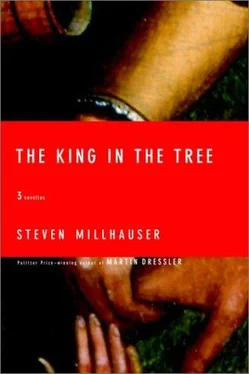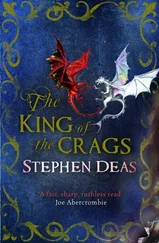I have noticed one change. Before his marriage to Queen Ysolt, the King was master of his countenance: no one studying the King’s face could see anything behind the smooth brow, the broad planes of his cheeks, the still mouth, the clear, intelligent eyes. Now, in that well-loved face, one can see adoration, suspicion, jealousy, yearning, sudden doubt.
The ladies of the court speak continually of love.
Love, they say, ennobles the heart and exalts the soul. Love is a divine gift that permits us to enter the Earthly Paradise, from which we have been banished because of our base natures and which is a type and reflection of the Heavenly Kingdom. I have heard the wife of a baron maintain in the middle of a summer afternoon that love is a purifying flame which burns only in a lofty heart, and I have seen that same baroness in the dark of night standing against the wall of the granary with her robes raised above her waist while her gallant lover, grunting like a bull, charms her with his delicate attentions. Love, I have heard the court ladies say, is not a contractual obligation upheld by the brute authority of law, but a form of spiritual consent, freely given. By this they mean that love is possible only outside of marriage. It is these same ladies who whisper about the Queen, glance at her with malicious disapproval, gossip about the King’s nephew, and smile kindly at their husbands while devoting every instant of their waking hours to the arrangement of clandestine meetings with their virile young lovers.
The ladies of the court are very beautiful.
The immediate source of the court rumors is Oswin, the chief steward. It is he who first reported to the King the glances exchanged by the Queen and his nephew. The steward is a loyal servant of the crown, skilled in all that relates to household management, scrupulous in his accounts, exact of speech, proud, censorious, secretive, disinclined to laughter. He is fond of rich cloaks trimmed in miniver, jeweled rings, cups of gold. He has two weaknesses. Because he is the son of a burgher and has made his way at court through talent, tireless work, and steadfast purpose, he nurses a grievance against the rich and well-born. This failing leads him to overestimate his own considerable accomplishments and to imagine slights in the eye-blink of a baron. His second weakness lies in his displeasing looks. Although Oswin is not an ugly man, his features make a disagreeable impression: his eyes are small and cold, his nose thrusts forward, one upper tooth grows at an angle. The lady Fortuna, he believes, has treated him unjustly, while lavishing upon fools her gifts of landed estates, hereditary titles, and pretty teeth. His lust for highborn ladies, which appears inexhaustible, is not pleasant to contemplate. His successes never satisfy him.
Oswin follows the Queen ruthlessly with his eyes. His lust shows on his face like a knife-gash.
It is easy to imagine that Oswin’s report to the King was caused by injured pride and thwarted desire. When the Queen smiles at the steward, her gray, faintly melancholy eyes do not see him; more often she passes him by without a look. His invisibility, his terrible transparency, must exasperate him beyond measure. But such an explanation, however reasonable, is true only up to a certain point. In judging the motives of a man like the steward, one must bear in mind his loyalty to the crown; Oswin’s obedience has never been in doubt. It is his duty to report to the King any sign of disorder in the household, any form of behavior unbefitting a vassal or a wife. In this sense his spiteful report is the laudable act of a servant devoted to his master. It is also true that Oswin has always been jealous of the King’s nephew, whom the King loves immoderately.
No one can deny that the young Queen and Tristan take pleasure in one another’s company.
The Queen’s beauty is remarkable but difficult to account for. Each of her features, considered separately, is exceeded in perfection by the exquisite eyelid, the flawless cheek, the incomparable lip of a court lady, and yet, united, they compose a pattern of beauty that surpasses any other at court. Is it the harmony of her parts that is so beguiling? I believe the secret lies elsewhere. The Queen, like all beautiful women, has about her a remoteness, a coolness of perfection, such as one feels in a jewel or a silver goblet. Such beauty holds us at a distance, chills us, in truth repels us a little. In this sense it may be argued that the highest expression of beauty is nothing but a rare and enigmatic form of ugliness. But working against the chill of the Queen’s beauty is some other force — a force of imperfection, of unruliness. Her plaited yellow hair, a hint of which is visible at her temples, where the wimple is joined to her head covering, is so richly golden and perfectly arranged that it appears to have been fashioned by a master goldsmith with repeated blows of his small hammer, yet here and there a strand escapes and glitters in the sun. These are the strands that break the heart. Her lips are perfectly formed, but when she smiles, one side of her mouth begins to turn upward before the other. Her left eyelid dips at the outer corner. Her elegant nostrils, shaped by the delicate chisel of a carver of Old Testament scenes on the panels of a cathedral door, do not match precisely. When she laughs, however mildly, something leaps into her cheeks and eyes that was not there before — something that bursts out of her like a force of disruption.
The secret of the Queen’s beauty lies in what shatters it.
Is it surprising that gossip and slander have joined the young Queen and Tristan? They are radiant with youth, disarming in beauty. When the King, the Queen, and Tristan are seen walking together, the eye helplessly binds the young Queen and Tristan, separating them cruelly from the King. It is also true that the King has formally requested Tristan to love and protect the Queen; when the King is meeting with his counselors in the great hall, or following his hounds in the royal forest, she is always with Tristan. They walk in the Queen’s garden, stroll among the trees of the orchard, ride in the forest, talk in the women’s quarters above the royal bedchamber. Such behavior can lead only to malicious gossip. The Queen is very busy, say the court ladies: she has one husband by night, and one husband by day. They fail to understand that it is precisely the King’s love for Tristan that makes him place his beloved Ysolt under his protection. Would they leave her open to the attentions of the steward?
Tristan is honorable. He would lay down his life for his King. The Queen walks beside him with downcast eyes. Strands of her yellow hair catch the sun.
They are too much together. I do not like these rumors.
This morning I was summoned to the King’s private chamber in the northwest tower. I found the King seated alone at a small table before his chessboard. He motioned for me to sit down across from him and, after taking thought, moved the white king’s pawn two squares forward. His long fingers lingered caressingly on the artful folds of the sleeves of the stern-faced pawn, before releasing it; of his nine sets of chesspieces, these are his favorite, carved from walrus tusks. In reply I moved the pawn of my black king two squares forward. He immediately moved the queen’s pawn two squares forward, inviting a capture. At this point an odd look came into his eyes, and he raised his hand to stop me from moving. “Now, Thomas,” he said, “if you were King of Cornwall, which move would you anticipate?”
“If I were King of Cornwall, my lord, I would anticipate one of three moves: a direct capture, the move of my king’s knight to the square before the bishop, or the advance of my queen’s pawn.”
The King, who plays chess well, listened closely to this uninteresting reply. He stared down at the three pawns and looked at me again. “I have never forgotten what you said to me that day in the garden.”
Читать дальше












